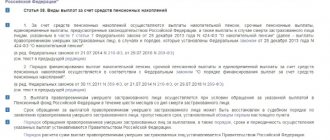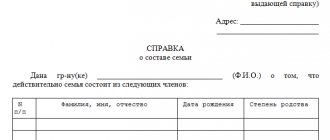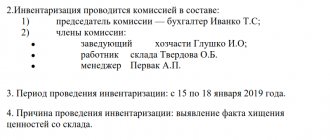Who can be the heir?
In the Russian Federation, there are two options for inheritance - by will or by law. The first option takes precedence if the will is drawn up correctly. In this case, the will of the deceased is executed, who independently distributes real estate and other property.
But there are categories that receive a share in the inheritance regardless of the presence of a will:
- Imperfect or incompetent children.
- Incapacitated spouse.
- Incompetent parents.
- Dependents of the testator who lived with him for at least 1 year.
If there is no will or it is declared invalid, the procedure of inheritance by law is used.
Chapter 63 of the Civil Code of the Russian Federation determines the order of inheritance:
| 1st stage | Spouse, children and parents |
| 2nd stage | Grandparents, brothers and sisters |
| 3rd stage | Uncles and aunts |
| 4th stage | Great-grandparents |
| 5th stage | Great-grandparents, cousins, grandsons and granddaughters |
| 6th stage | Cousins and nieces, great uncles and aunts |
| 7th stage | Stepfather, stepmother, stepsons and stepdaughters |
| 8th stage | Dependents |
There is also inheritance by right of representation. It is used when, after the opening of the inheritance, one of the heirs of the called line dies. Then his closest relatives will inherit instead. If one of the applicants refuses the property, its part is distributed among the heirs in his turn.
Note! It is important to contact the notary in charge of the case within 6 months after the death of the testator. Otherwise, only the court can restore the term. But this requires good reasons.
What does an heir need to know to receive a house after the death of his parents?
Let's assume there was no will in the first place. In this case, the rights to inherit the house after the death of the mother are received by the closest relatives of the deceased woman.
The circle consists of children, her parents, and her legal spouse. They are classified as heirs of the first order.
Their shares in accordance with paragraph 2 of Article 1141 of the Civil Code of the Russian Federation are recognized as equal.
For example, after the death of her mother, she was left with her husband, her two children, and her own father. In this situation, the home ownership and a certain area of land under it will go to each of the heirs who contacted the notary in the amount of ¼.
There is a certain time period for heirs to claim rights to property. Contents of Art. 1154 of the Civil Code of the Russian Federation states that six months are allotted for accepting an inheritance from the date of loss of a close relative.
This step involves submitting a prepared application to a notary with the required package of documents in relation to the composition of the property. The appeal may concern both the acceptance of an inheritance and the receipt of a certificate for it.
As a general principle, it is possible to take ownership of real estate and the land associated with it 6 months from the date of the death of the testator. Everything can happen earlier under certain conditions, but this will be discussed below.
What if the testator has not completed documents for the house?
In Russia, it is not uncommon for more than one generation to live in a house. Often there are no title documents for it. But to register an inheritance, you must submit documents to a notary. They confirm the fact that the property belongs to a specific owner.
According to Art. 6 Federal Law No. 122 “On state registration of rights to real estate and transactions with it”, the right can be confirmed by documents issued before the entry into force of this law in 1997. If there is no information about the house in the real estate register, any title documents can be considered.
The following can be used as such a document:
- The act of transferring the house by the administration.
- Contract of sale.
- Donation agreement.
- Barter agreement.
- Garden records and other documents proving bona fide ownership.
- Payment documents.
Note! If there are no supporting documents, the right will have to be defended in court.
Registration of real estate according to the law
With the death of either parent (or both), the children face the need to formalize an inheritance. By law, this can be done no less than 6 months from the date of opening of the inheritance. But this does not mean that all this time you just need to wait and do nothing.
You should start preparing the necessary documents as early as possible. The most valuable inherited property is, of course, real estate. Heirs should carry out all actions prescribed by law so as not to lose their apartment or house, since in the Russian Federation there is a right of declaration: in order to receive an inheritance, this must be declared.
So, today we are talking about how to register real estate after the death of your parents.
As a rule, the place of residence coincides with the place of registration. If the deceased did not have registration and his last place of residence is unknown, the inheritance case is opened at the location of most of his property.
With the death of either parent (or both), the children face the need to formalize an inheritance. By law, this can be done no less than 6 months from the date of opening of the inheritance. But this does not mean that all this time you just need to wait and do nothing. You should start preparing the necessary documents as early as possible.
The most valuable inherited property is, of course, real estate. Heirs should carry out all actions prescribed by law so as not to lose their apartment or house, since in the Russian Federation there is a right of declaration: in order to receive an inheritance, this must be declared. So, today we are talking about how to register real estate after the death of your parents.
Usually, when parents have an only child or two, a will is not drawn up, since the children, after the death of their parents, will receive all the property by law. It’s a different matter when, in addition to the testators themselves, their relatives (except children) lived in this property (apartment, private house), then it will be necessary to draw up a will to determine the rights of everyone in accordance with the last will of the owner of this property.
We invite you to read: How can an individual find out about property?
A will is a document drawn up and notarized (Article 1125 of the Civil Code of the Russian Federation). A will that is not properly certified has no legal force. Until the opening of the inheritance, the will is stored in the notary chamber, being a guarantee of the fulfillment of the last will of the testator. The notary certifies that at the time of signing the will, the testator himself:
- was of sound mind and sound memory;
- was competent;
- gave an account of his actions.
The notary also makes sure that there are papers confirming the testator’s ownership of the property listed in the will (extracts from the Unified State Register of Real Estate).
In the case when we are talking about real estate, the will indicates the full characteristics of the object, and then a copy of the title document (extract from the Unified State Register) is attached to it. It is necessary to follow the procedure extremely carefully so that subsequently there will be no doubt that the will was drawn up in accordance with all the rules, without pressure from third parties, and the testator is aware of what he is doing.
A valid will is a guide to action for the heirs and for the notary; he will formalize the inheritance when it is opened in full accordance with the last will of the deceased. For example, a parent can bequeath his apartment to only one child, leaving the remaining adult children without inheritance.
Only minor children, dependents, and spouses have the right to an obligatory share, and if the testator refuses to mention them in the will, they receive the right through the court to demand their share - half of what is due when registering an inheritance by law.
In the absence of a will, the heirs are left to inherit the property according to the law. In Art. 1141 of the Civil Code of the Russian Federation specifies the order of priority, according to which all relatives of the deceased can claim the inheritance.
The law determines that if there is at least one heir of the first priority, the remaining heirs have no rights to inheritance. Accordingly, after the death of both parents, children can claim the property; according to the law, the property will be divided between them in equal shares. If there are no children, then the rights of the heirs of the next orders come into effect.
In inheritance by law, the age of the children does not matter, as is the case in inheritance by will. Regardless of where the children live, how old they are, or how many children there are, the parents’ property upon inheritance by law will be divided among all of them in equal shares. This right is undeniable, but has a statute of limitations.
After the expiration of the 6 months allotted for filing applications for inheritance, children who did not apply have a period of 3 years to, in the absence of valid reasons, exercise the right to enter into an inheritance. After this time, you will have to restore the missed deadline in court and prove that there were really good reasons for this.
Only minor children, dependents, and spouses have the right to an obligatory share, and if the testator refuses to mention them in the will, they receive the right through the court to demand their share - half of what is due when registering an inheritance by law.
In inheritance by law, the age of the children does not matter, as is the case in inheritance by will. Regardless of where the children live, how old they are, or how many children there are, the parents’ property upon inheritance by law will be divided among all of them in equal shares. This right is undeniable, but has a statute of limitations.
After the expiration of the 6 months allotted for filing applications for inheritance, children who did not apply have a period of 3 years to, in the absence of valid reasons, exercise the right to enter into an inheritance. After this time, you will have to restore the missed deadline in court and prove that there were really good reasons for this.
How to prepare documents for a house?
If the documents are missing at home, but it has been officially registered, just contact the nearest branch of Rosreestr or MFC. It is necessary to write a standard application to receive an extract from the Unified State Register of Real Estate. It is available to everyone. Such an extract confirms the ownership of the testator. Additionally, from Rosreestr you can request a copy of the title document on the basis of which the transaction was registered.
If ownership of the house has not been registered and there are no documents, you must contact the district administration. They will provide a copy of the documents if the house was transferred from the state. These documents can also be obtained by a notary by making the appropriate requests.
If the property has not been registered in Rosreestr, it is necessary to apply to the court with a statement of claim to recognize the ownership of the house by inheritance. Entry into inheritance becomes possible from the date of a positive court decision. It must be handed over to a notary so that he can open an inheritance case.
It is important to go to court as quickly as possible, as the proceedings can last several months. It is important that there is time left to contact the notary with documents before the expiration of 6 months from the date of death of the testator. Otherwise, you will have to go to court again to restore the term.
What to do if you didn’t have time to contact a notary in time
Often, after the death of their parents, children do not have time to submit documents to a notary within 6 months in order to register rights to the house and land. In this situation, the law says that the deadline for accepting the inheritance has expired .
The legislation provides for 2 ways out of this situation.
Thus, it is possible to restore the lost time to perform the required actions with the consent of the remaining heirs. It must be given in the presence of a notary or sealed by him.
The second option for renewing the deadlines involves filing a corresponding claim in court with other claimants for the inheritance. Materials are submitted on the territory of the real estate location and the site.
The claim requires substantiation of the reasons why it was impossible to pay a visit to the notary in a timely manner. If there is supporting written evidence, copies of them are also attached.
You have 6 months to submit your application. They are counted from the moment when the circumstances preventing the acceptance of the inheritance have disappeared.
The claim itself must contain a request not only to restore the terms, but also to recognize the rights to the disputed property. When the requirements are satisfied, property is simultaneously redistributed among the circle of heirs.
Entry into inheritance
After the documents are submitted and all heirs appear, the notary announces the will of the testator or formalizes the inheritance according to the law. All heirs are issued a certificate with which they can apply to Rosreestr to change the owner.
The registrar accepts the following documents:
- Death certificate of the testator.
- Heirs' passports.
- Birth certificates, if future owners include children under 14 years of age.
- Certificate of inheritance.
- Title documents for the house and plot.
- Receipt for payment of state duty.
- Statement of the established form.
An employee of Rosreestr will accept the documents and issue a receipt for their receipt. On the appointed day, you must appear for documents and an extract from the Unified State Register.
Shared ownership
If there are several owners, only the share belonging to the testator is inherited.
If it is transferred to a person who does not live and does not have property in this house, the rights of incapacitated and minor persons are also taken into account. If other co-owners are recognized as heirs, their share increases. After receiving documents from a notary, they should also be submitted for registration to Rosreestr . This is necessary to transfer the share to the ownership of other owners.
Tax
According to current legislation, heirs are required to pay tax upon inheritance. It is determined depending on the value of the house and the land on which it is located.
If the cost of the house exceeds 1 million rubles, the following tax amount is formed:
- 0,3 % paid by the heirs of the first stage. The total amount cannot exceed 100 thousand rubles.
- 0,6 % the rest of the heirs pay. But they should not pay more than 1 million rubles.
The following categories of persons are exempt from paying tax:
- Heroes of the USSR and the Russian Federation.
- Disabled people of groups 1 and 2.
- Disabled children.
- Participants of the Great Patriotic War.
- Full Knights of the Order of Glory.
- Persons serving in the Armed Forces of the Russian Federation.
Thus, heirs can take over the rights even if there are no documents for the house and land. But for this it is necessary to restore the documents or go to court to be recognized as an heir by a court decision.
The video story will tell you how to enter into an inheritance if there are no documents
What are the possible options?
You cannot enter into part of an inheritance; it can only be accepted in its entirety, and a group of heirs accepts it in its entirety, even if there is only one (Article 1152 of the Civil Code of the Russian Federation). This means that the debts of the deceased also pass into the general estate. For example, an apartment pledged to a bank under a mortgage agreement will be transferred to the heirs along with the obligation of the deceased to repay the debt to the lender. You cannot accept an apartment and refuse the debt, but you can refuse the apartment and the debt, since the law does not oblige you to accept an inheritance.
In the first case, the expression of will is mandatory if it does not violate the rights of third parties, otherwise the law comes into force (Article 1111 of the Civil Code of the Russian Federation). A will can be challenged in court; there are a number of reasons for this in the law (Articles 178, 179 of the Civil Code of the Russian Federation). If the will is challenged by a court decision and declared invalid, then the inherited property, including real estate, is divided among all heirs who have declared their rights in the shares prescribed by law (Article 1164 of the Civil Code of the Russian Federation).
The inheritance opens on the day when the date of death is registered (confirmed by a death certificate). The place of opening of the inheritance will be recognized as the place of permanent registration of the deceased, or, if it is not possible to establish this fact, the location of the inherited property (real estate). If several real estate objects are included in the inheritance estate, then the address of the most valuable object will be recognized as the place of opening of the inheritance. The value of each object is assumed to be equal to its market value (determined through the examination of an independent appraisal company).
The inheritance opens on the day when the date of death is registered (confirmed by a death certificate). The place of opening of the inheritance will be recognized as the place of permanent registration of the deceased, or, if it is not possible to establish this fact, the location of the inherited property (real estate). If several real estate objects are included in the inheritance estate, then the address of the most valuable object will be recognized as the place of opening of the inheritance. The value of each object is assumed to be equal to its market value (determined through the examination of an independent appraisal company).
Actual acceptance of inheritance
In addition to the legal acceptance of an inheritance, the law also recognizes the actual acceptance. This means the implementation by heirs of actions aimed at preserving the inherited property. In relation to real estate, this means living in an apartment (house), paying for utilities, repairs, fencing the property from encroachment by third parties and other similar actions. Article 1153 of the Civil Code of the Russian Federation defines the actual entry into property rights.
In relation to a deceased relative (parent), actual entry into inheritance is just as legitimate as documentary entry (Article 1153 of the Civil Code of the Russian Federation). But children will be able to dispose of their parents’ property (an apartment, a house, a plot of land) only after they have properly acquired ownership rights - they submit an application to a notary and register the right in the Unified State Register.
Who can receive
After the death of a person, the owners of real estate according to the law become the first-degree heirs: his spouse, parents and children. In their absence, relatives of other lines of kinship may claim a share.
However, they will be able to obtain housing only if the previous line called for inheritance refuses.
If there is a will, the apartment or house can be inherited by persons designated by the will of the deceased. If the persons who were dependent on the testator, his children and parents are not included in the circle of successors under the will, then in any case they claim a share, since they are obligatory heirs.
The advantages and disadvantages of deeds of gift and wills can be found here.
Methods
Today, the legislation of the Russian Federation provides for two main ways to obtain the right to inherit: by law and by will.
In law
The situation in which the testator did not leave a testamentary document provides for the receipt of an inheritance in accordance with the sequence regulated by the Civil Code of the Russian Federation. The right of inheritance is received by relatives in accordance with the closeness of the family relationship with the deceased.
You can receive an inheritance by law only if you have a certificate that confirms such rights of the successor. It is issued by a notary after the heir submits an application and documents confirming the existence of a family relationship with the deceased.
By will
Receipt of real estate under a will is possible only if there is this document drawn up during the life of the testator in accordance with the requirements of the law.
If there are obligatory heirs who were not indicated in the will, then they can still receive their share - after applying for inheritance. The portion of the deceased's property due to them will be determined by the judicial authority.





